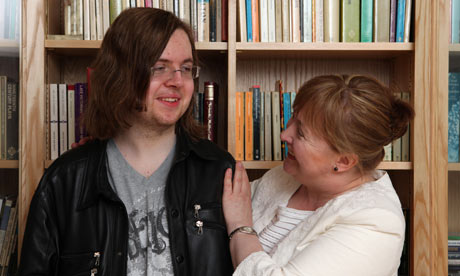
by Ellen Notbohm
from the book Ten Things Every Child with Autism Wishes You Knew (2005, Future Horizons, Inc.) Reprinted with permission of author
Some days it seems the only predictable thing about it is the unpredictability. The only consistent attribute -- the inconsistency. There is little argument on any level but that autism is baffling, even to those who spend their lives around it. The child who lives with autism may look “normal” but his behavior can be perplexing and downright difficult.
Autism was once thought an “incurable” disorder, but that notion is crumbling in the face knowledge and understanding that is increasing even as you read this. Every day, individuals with autism are showing us that they can overcome, compensate for and otherwise manage many of autism’s most challenging characteristics. Equipping those around our children with simple understanding of autism’s most basic elements has a tremendous impact on their ability to journey towards productive, independent adulthood.
Autism is an extremely complex disorder but for purposes of this one article, we can distill its myriad characteristics into four fundamental areas: sensory processing challenges, speech/language delays and impairments, the elusive social interaction skills and whole child/self-esteem issues. And though these four elements may be common to many children, keep front-of-mind the fact that autism is a spectrum disorder: no two (or ten or twenty) children with autism will be completely alike. Every child will be at a different point on the spectrum. And, just as importantly – every parent, teacher and caregiver will be at a different point on the spectrum. Child or adult, each will have a unique set of needs.
Here are ten things every child with autism wishes you knew:
1. I am first and foremost a child. My autism is only one aspect of my total character. It does not define me as a person. Are you a person with thoughts, feelings and many talents, or are you just fat (overweight), myopic (wear glasses) or klutzy (uncoordinated, not good at sports)? Those may be things that I see first when I meet you, but they are not necessarily what you are all about.
As an adult, you have some control over how you define yourself. If you want to single out a single characteristic, you can make that known. As a child, I am still unfolding. Neither you nor I yet know what I may be capable of. Defining me by one characteristic runs the danger of setting up an expectation that may be too low. And if I get a sense that you don’t think I “can do it,” my natural response will be: Why try?
2. My sensory perceptions are disordered. Sensory integration may be the most difficult aspect of autism to understand, but it is arguably the most critical. It his means that the ordinary sights, sounds, smells, tastes and touches of everyday that you may not even notice can be downright painful for me. The very environment in which I have to live often seems hostile. I may appear withdrawn or belligerent to you but I am really just trying to defend myself. Here is why a “simple” trip to the grocery store may be hell for me:
My hearing may be hyper-acute. Dozens of people are talking at once. The loudspeaker booms today’s special. Musak whines from the sound system. Cash registers beep and cough, a coffee grinder is chugging. The meat cutter screeches, babies wail, carts creak, the fluorescent lighting hums. My brain can’t filter all the input and I’m in overload!
My sense of smell may be highly sensitive. The fish at the meat counter isn’t quite fresh, the guy standing next to us hasn’t showered today, the deli is handing out sausage samples, the baby in line ahead of us has a poopy diaper, they’re mopping up pickles on aisle 3 with ammonia….I can’t sort it all out. I am dangerously nauseated.
Because I am visually oriented (see more on this below), this may be my first sense to become overstimulated. The fluorescent light is not only too bright, it buzzes and hums. The room seems to pulsate and it hurts my eyes. The pulsating light bounces off everything and distorts what I am seeing -- the space seems to be constantly changing. There’s glare from windows, too many items for me to be able to focus (I may compensate with "tunnel vision"), moving fans on the ceiling, so many bodies in constant motion. All this affects my vestibular and proprioceptive senses, and now I can’t even tell where my body is in space.
3. Please remember to distinguish between won’t (I choose not to) and can’t (I am not able to).
Receptive and expressive language and vocabulary can be major challenges for me. It isn’t that I don’t listen to instructions. It’s that I can’t understand you. When you call to me from across the room, this is what I hear: “*&^%$#@, Billy. #$%^*&^%$&*………” Instead, come speak directly to me in plain words: “Please put your book in your desk, Billy. It’s time to go to lunch.” This tells me what you want me to do and what is going to happen next. Now it is much easier for me to comply.
4. I am a concrete thinker. This means I interpret language very literally. It’s very confusing for me when you say, “Hold your horses, cowboy!” when what you really mean is “Please stop running.” Don’t tell me something is a “piece of cake” when there is no dessert in sight and what you really mean is “this will be easy for you to do.” When you say “Jamie really burned up the track,” I see a kid playing with matches. Please just tell me “Jamie ran very fast.”
Idioms, puns, nuances, double entendres, inference, metaphors, allusions and sarcasm are lost on me.
5. Please be patient with my limited vocabulary. It’s hard for me to tell you what I need when I don’t know the words to describe my feelings. I may be hungry, frustrated, frightened or confused but right now those words are beyond my ability to express. Be alert for body language, withdrawal, agitation or other signs that something is wrong.
Or, there’s a flip side to this: I may sound like a “little professor” or movie star, rattling off words or whole scripts well beyond my developmental age. These are messages I have memorized from the world around me to compensate for my language deficits because I know I am expected to respond when spoken to. They may come from books, TV, the speech of other people. It is called “echolalia.” I don’t necessarily understand the context or the terminology I’m using. I just know that it gets me off the hook for coming up with a reply.
6. Because language is so difficult for me, I am very visually oriented. Please show me how to do something rather than just telling me. And please be prepared to show me many times. Lots of consistent repetition helps me learn.
A visual schedule is extremely helpful as I move through my day. Like your day-timer, it relieves me of the stress of having to remember what comes next, makes for smooth transition between activities, helps me manage my time and meet your expectations.
I won’t lose the need for a visual schedule as I get older, but my “level of representation” may change. Before I can read, I need a visual schedule with photographs or simple drawings. As I get older, a combination of words and pictures may work, and later still, just words.
7. Please focus and build on what I can do rather than what I can’t do. Like any other human, I can’t learn in an environment where I’m constantly made to feel that I’m not good enough and that I need “fixing.” Trying anything new when I am almost sure to be met with criticism, however “constructive,” becomes something to be avoided. Look for my strengths and you will find them. There is more than one “right” way to do most things.
8. Please help me with social interactions. It may look like I don’t want to play with the other kids on the playground, but sometimes it’s just that I simply do not know how to start a conversation or enter a play situation. If you can encourage other children to invite me to join them at kickball or shooting baskets, it may be that I’m delighted to be included.
I do best in structured play activities that have a clear beginning and end. I don’t know how to “read” facial expressions, body language or the emotions of others, so I appreciate ongoing coaching in proper social responses. For example, if I laugh when Emily falls off the slide, it’s not that I think it’s funny. It’s that I don’t know the proper response. Teach me to say “Are you OK?”
9. Try to identify what triggers my meltdowns. Meltdowns, blow-ups, tantrums or whatever you want to call them are even more horrid for me than they are for you. They occur because one or more of my senses has gone into overload. If you can figure out why my meltdowns occur, they can be prevented. Keep a log noting times, settings, people, activities. A pattern may emerge.
Try to remember that all behavior is a form of communication. It tells you, when my words cannot, how I perceive something that is happening in my environment.
Parents, keep in mind as well: persistent behavior may have an underlying medical cause. Food allergies and sensitivities, sleep disorders and gastrointestinal problems can all have profound effects on behavior.
10. Love me unconditionally. Banish thoughts like, “If he would just……” and “Why can’t she…..” You did not fulfill every last expectation your parents had for you and you wouldn’t like being constantly reminded of it. I did not choose to have autism. But remember that it is happening to me, not you. Without your support, my chances of successful, self-reliant adulthood are slim. With your support and guidance, the possibilities are broader than you might think. I promise you – I am worth it.
And finally, three words: Patience. Patience. Patience. Work to view my autism as a different ability rather than a disability. Look past what you may see as limitations and see the gifts autism has given me. It may be true that I’m not good at eye contact or conversation, but have you noticed that I don’t lie, cheat at games, tattle on my classmates or pass judgment on other people? Also true that I probably won’t be the next Michael Jordan. But with my attention to fine detail and capacity for extraordinary focus, I might be the next Einstein. Or Mozart. Or Van Gogh.
They may have had autism too.
The answer to Alzheimer’s, the enigma of extraterrestrial life -- what future achievements from today’s children with autism, children like me, lie ahead?
All that I might become won’t happen without you as my foundation. Be my advocate, be my friend, and we’ll see just how far I can go.
____________________________________________
© 2005 Ellen Notbohm
Please contact the author for permission to reproduce in any way, including re-posting on the Internet.
Ellen Notbohm is author of Ten Things Every Child with Autism Wishes You Knew, Ten Things Your Student with Autism Wishes You Knew, and The Autism Trail Guide: Postcards from the Road Less Traveled, all ForeWord Book of the Year finalists. She is also co-author of the award-winning 1001 Great Ideas for Teaching and Raising Children with Autism Spectrum Disorders, a columnist for Autism Asperger’s Digest and Children’s Voice, and a contributor to numerous publications and websites around the world. To contact Ellen or explore her work, please visit www.ellennotbohm.com.






















